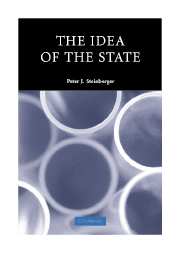6 - The Organic State: Democracy and Freedom
Published online by Cambridge University Press: 22 September 2009
Summary
During long periods in the history of the West – indeed, for perhaps a millennium or more – discussions of politics and political society presupposed, as though it were a law of nature, the inevitability of monarchy. That this should have been the case is, in a sense, remarkable. For the idea that monarchy is merely one of a wide variety of feasible and potentially desirable political forms is obviously very old, well reflected in the political thought and political practice of antiquity and hardly unknown to thinkers of the Middle Ages. Yet if we consider a vast stretch of history beginning roughly with the era of the Antonines, if not earlier, and extending at least until the end of the thirteenth century, it is not easy to find much in the way of serious political thought that does not presuppose monarchy. In this respect, moreover, political theory and political practice were very much of a piece. Kingly rule may indeed have assumed many different forms and been justified in any number of ways. But the notion that every political society would and should in some sense be monarchical was largely taken for granted.
In our own time, something similar might be said for democracy. It's true that many political regimes of the past hundred years or so – indeed, almost certainly the vast majority – have not been especially democratic.
- Type
- Chapter
- Information
- The Idea of the State , pp. 266 - 324Publisher: Cambridge University PressPrint publication year: 2005

